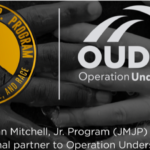The Maryland Lynching Truth, Racial Healing, and Transformation Oral History Initiative has been established to support the ongoing efforts of seeking racial justice and evoking narrative change throughout The Free State.
FOR IMMEDIATE RELEASE
Date: August 30, 2021
Project Contact: Jack Del Nunzio, Oral History Coordinator: mdlynchingsoralhistory@gmail.com
Arlington, VA – The Maryland Lynching Truth, Racial Healing and Transformation Oral History Initiative has been launched by the John Mitchell, Jr. Program for History, Justice and Race in partnership with the African and African American Studies Program at George Mason University, the Maryland Lynching Memorial Project, the Maryland Lynching Truth & Reconciliation Commission, the Lillie Carroll Jackson Civil Rights Museum at Morgan State University, and #BreatheWithMe Revolution.
The initiative is looking to identify and conduct virtual interviews with living descendants, relatives and those connected to the more than 40 documented racial terror lynchings that took place in the state of Maryland between 1854 and 1933. Priority is being given to living eyewitnesses who were born on or before 1933, specifically connected to the cases of Matthew Williams (1931) and George Armwood (1933), respectively. The Initiative is equally concerned with gathering intergenerational testimony, seeing as many of the cases of racial terror lynching in MD likely have few—if any—surviving eyewitnesses. “In interviewing the relatives and descendants of victims, we not only are able to gain proximity to the truth, but also gain proximity to how later generations were shaped by these atrocities in interpreting history and their own place in contemporary American society, ” said George Mason University Professor and Mitchell Program Director, Dr. Charles L Chavis, Jr.
The Oral History Initiative was established to support the ongoing efforts of local coalitions and communities who have devoted their time and energy to confront the legacy of racial terror lynching throughout the state of Maryland.
“Our reparative oral history process ensures that interviewees—particularly the descendants of lynching victims—are afforded transparency, respect, dignity, and safety as well as ownership and authority across the entire interview process. At the same time, localities will be able to adapt Initiative resources according to their space and place, their designated interviewees and interviewers, and their specific cases of racial terror lynching, ” said Oral History Program Director, Jack Del Nunzio. For example, in partnership with the Maryland Lynching Truth and Reconciliation Commission, oral history interviewees and interviewers—as well as those involved throughout the public hearing process—will have access to trauma informed, culturally responsive social worker support.
In 2019, the Maryland General Assembly enacted, and Governor Larry Hogan signed into law, legislation establishing the Maryland Lynching Truth and Reconciliation Commission as the first Commission dedicated to investigating racial terror lynching in the United States. Sponsored by Delegate Joseline A. Peña-Melnyk, (2019) House Bill 307 tasks the Commission with researching cases of lynching and holding public hearings in communities where racial terror lynching took place, and developing recommendations for addressing the legacy of lynching that are rooted in restorative justice. Oral history collection will be a vital precursor to the public hearings; not only must the stories of descendants of victims and community members most harmed by racial terror be heard, but these individuals must be included in the decision-making process.
The legislators behind the decision to award the commission stated that, “To address past injustices, we must fully understand them and acknowledge their lasting impact. This new federal funding will help the Commission to dedicate more resources to study unsolved lynchings throughout Maryland. These brutal acts of racial violence – which have been downplayed and outright ignored for much of our nation’s history – must be brought to light.”
The Maryland Lynching Truth, Racial Healing and Transformation Oral History Initiative’s goal is to empower local county coalitions throughout the communities of Maryland by providing them with the resources needed to responsibly conduct, share, and preserve interviews with the descendants and relatives of racial terror lynching victims, perpetrators, and witnesses; as well as historians, activists, politicians, and other relevant parties.





